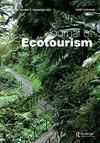The economic impact of recreational trails: a systematic literature review
IF 2.4
Q2 HOSPITALITY, LEISURE, SPORT & TOURISM
引用次数: 4
Abstract
ABSTRACT Recreational trails are a type of nature-based tourism providing various activities such as hiking, biking, rafting or horseback riding. Increasing investment in infrastructure and touristic services development has resulted in higher visitor expenditure and thus contributed to economic development. This study aims to review the current economic impact assessment studies on recreational trail tourism and to extract the main economic impact determinants. A systematic literature review analysis was applied in a quantitative approach about economic models, study cases of nature-based tourism, comparison of economic impacts. A qualitative analysis was then applied with an inductive approach to compare the economic impacts of nature-based tourism forms and identify the main determinants of economic impact. This study suggests that I-O is the most suitable theoretical approach to study the economic impact of long-distance trails, while the Keynesian multiplier approach and Ad hoc model are the most suitable approaches to study the economic impact of short-distance trails.休闲步道的经济影响:系统文献综述
休闲步道是一种以自然为基础的旅游,提供各种活动,如徒步旅行、骑自行车、漂流或骑马。增加对基础设施和旅游服务发展的投资,增加了游客的消费,从而促进了经济发展。本研究旨在回顾目前休闲步道旅游的经济影响评价研究,并提取主要经济影响因素。本文对自然旅游的经济模型、研究案例、经济影响比较等方面进行了系统的文献分析。然后采用归纳方法进行定性分析,比较基于自然的旅游形式的经济影响,并确定经济影响的主要决定因素。研究表明,I-O是研究长距离步道经济影响最合适的理论方法,凯恩斯乘数法和Ad hoc模型是研究短途步道经济影响最合适的理论方法。
本文章由计算机程序翻译,如有差异,请以英文原文为准。
求助全文
约1分钟内获得全文
求助全文
来源期刊

Journal of Ecotourism
Social Sciences-Geography, Planning and Development
CiteScore
6.40
自引率
12.50%
发文量
32
期刊介绍:
The Journal of Ecotourism seeks to advance the field by examining the social, economic, and ecological aspects of ecotourism at a number of scales, and including regions from around the world. Journal of Ecotourism welcomes conceptual, theoretical, and empirical research, particularly where it contributes to the dissemination of new ideas and models of ecotourism planning, development, management, and good practice. While the focus of the journal rests on a type of tourism based principally on natural history - along with other associated features of the man-land nexus - it will consider papers which investigate ecotourism as part of a broader nature based tourism, as well as those works which compare or contrast ecotourism/ists with other forms of tourism/ists.
 求助内容:
求助内容: 应助结果提醒方式:
应助结果提醒方式:


